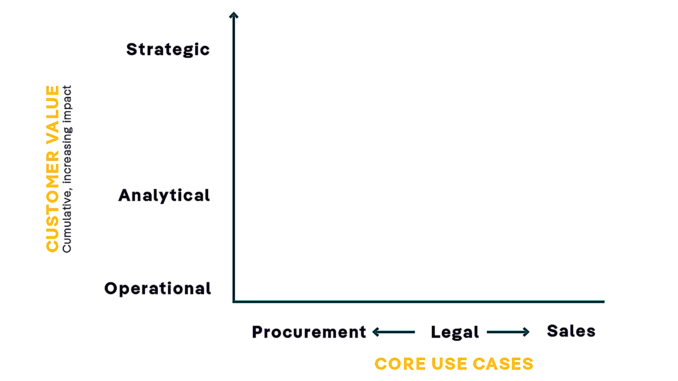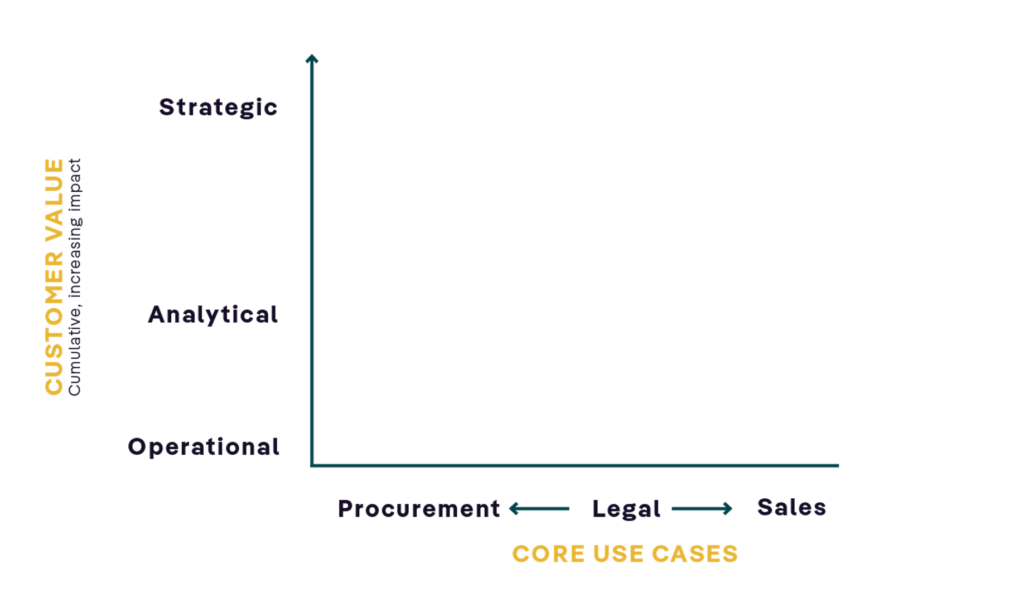
By Richa Kaul, Chief Strategy Officer, ContractPodAi
Legal team readiness is business readiness. The criticality of a legal function to a business is a fundamental truth. But events like COVID and regulations like GDPR further highlight the importance of in-house teams’ capacity and agility.
Legal digital transformations are taking hold quickly to support the relentless growth in volume and complexity of legal teams’ work. In 2020, Gartner predicted that legal technology budgets will grow three times in the next few years to support an increase in digital transformation and technology adoption.
More than 50% of legal tasks will be supported by some form of automation. This reduces manual work by lawyers, allowing them to focus on their higher-value, more strategic tasks. Contract management is a fast-growing pillar of the legal technology market, enabling teams to streamline day-to-day contract management process to alleviate manual workloads, optimise turnaround times, and manage overall business risk.
The search for a legal technology solution can feel overwhelming at its start. After all, the industry is relatively nascent and thus filled with many newer players – and most use similar language (and buzzwords) to describe themselves. Also, most legal teams have yet to take the lead on such digital transformation projects. So, it can be difficult to assess technology vendors and systems in a structured way.
As your team starts thinking about the contract management system landscape, it may be helpful to map software options according to their core use case and type of customer value. For example, different systems cater to legal, procurement, or sales use cases, so it is important to determine which team will functionally own your solution. And it is helpful to define what level of value a system will bring to your organisation – operational, analytical, or strategic value – as different companies need different things from their contract management system.

Core Use Cases in the Contract Management System Market
In essence, core use case can be defined by the ownership of the solution by a function or team in your business. Legal-focused solutions are owned by in-house legal teams. They are versatile enough to cover all contract processes across a business, as legal teams ultimately own all contracts for an organisation. Some contract management system providers in the market are more sales-focused, primarily covering an organisation’s customer contracts as a tool for the sales team. Some are procurement-focused, primarily covering vendor agreements as a tool for the sourcing team.
Typically speaking, it is the biggest pain point in the contracting process that defines the core use case for a contract management software search. For instance, if new sales or revenue recognition are slowed down due to prolonged contracting cycles, the sales-focused use case takes precedence early in the search. If vendor negotiations are slowed down due to inefficient workflow and approvals processes during vendor contracting, then a company may focus on a procurement solution.
Most often, these issues and others speak to an underlying need for greater efficiency, compliance, and visibility across all contracts and related processes in an organisation. This leads to a search for a more versatile legal-focused contract management system that serves all departments enterprise-wide: legal, sales, and procurement, as well HR, Finance, C-suite, and others.
Customer Value of Contract Management Software
A customer can categorise the contract management software market according to the types of value the various solutions deliver to clients. These categories break down into operational, analytical, and strategic value tiers. This is a cumulative scale with increasing impact along the three tiers.
Operational value is the baseline impact that any contract management software must deliver. Think digital repositories, which help with the standard organisation of agreements. Think automated workflows and approval management that optimise the contracting process at the most basic level. In other words, operational value is the basic process optimisation and support that a customer should expect from any software.
The next tier, analytical value, is the current market standard in the contract management space. Solutions in this tier offer actionable insights from the aggregated contractual data of a business. There are degrees of analytical value solutions. Most solutions offer advanced reporting that enables analysis but places the onus on the clients to derive their own specific insights. Other solutions deliver superior analytical value with pre-configured reports and visual dashboards to glean insights for customers automatically.
The final tier of solutions helps their clients achieve strategic value. These solutions really deliver against the core strategic reason that any executive wants a contract management solution: to significantly manage risk by rigorously and comprehensively increasing compliance and flagging options for risk reduction at an enterprise-wide level. Strategic solutions also enable customers to rely on and take for granted their contract management processes with zero risk of delivery through a partnership with their strategic CLM provider.
Typically, small to medium enterprises (up to a few hundred million dollars in annual revenue) tend to choose contract management systems in the operational tier. Businesses up to about $1 billion in annual revenue tend to choose analytical value CLM players, and business >$1B annual revenue or any international businesses tend to choose strategic solutions.
It is common for medium to large enterprise customers to start their search looking at an operational CLM solution and quickly level up. It is prudent for customers to consider the benefits of selecting a CLM player that has more functionality than you need today, so that you can prevent another CLM search in the near term.
Legal Digital Transformation
At the end of the
day, legal teams must be prepared for just about anything. Legal professionals need
to have the tools to be agile and responsive to the strategic needs of the day.
They need to have the time to lead — knowing
that they can rely on their technology solutions, and treat their contract
management system as a source of order in the natural chaos of their business.
To that end, more and more companies will undergo a legal digital transformation in the coming years and acquire a contract management system. Whatever their core use case is, they should set their sights on more strategic solutions. These systems will not only digitise and organise all agreements within a single platform, but also support end-to-end contract management, help manage overall risk, and deliver actionable insights for real business impact – at zero risk of delivery.
The first step of digitally transforming legal departments is as challenging as it is crucial. However, the right technology vendor will fully support a manageable and incremental transformation journey for their clients, and make it easy to adopt and implement a solution.
And rest assured that the legal digital transformation journey will only become easier — and deliver increasingly higher business returns — over time.
If you would like to learn more about this subject and how ContractPodAi can help, please see here.

[ Artificial Lawyer is proud to bring you this sponsored thought leadership article by ContractPodAi. ]
—
About the author: Richa Kaul is the Chief Strategy Officer at ContractPodAi. Prior to joining ContractPodAi, Kaul was a Managing Director at the Virginia Economic Development Partnership, leading the growth of the technology and professional services sectors across the state of Virginia. Previously, she was a management consultant at McKinsey & Company, supporting companies in their digitisation best practices. Read her most recent whitepaper, ‘How to Choose a Contract Management Solution‘.
1 Trackback / Pingback
Comments are closed.